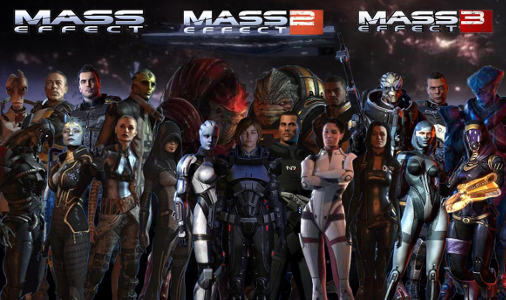
In the gaming world, franchises or series are becoming the bread and butter of developers’ and publishers’ work. New IP is rare amidst the flood of sequels, prequels and companions. Some call it a lack of creativity, and in some cases it definitely is, but for some series it’s a mark of a gaming experience that deserves far more than just one outing. The iconic example of this is the Mass Effect series.
For those that don’t know, Mass Effect is a series set in the future (about 200 years ahead of today) where humans have recently discovered that they aren’t alone in the galaxy. There are a large number of galactic races with deep histories and cultures to explore. There are hundreds of different planets (and space stations) with their own pasts and quirks. When talking about games, we often talk about the universe in which a game exists as being immersive and full – Mass Effect has this in both the literal and figurative sense. Another important aspect of Mass Effect is the titular technology available to the people of the galaxy. Science discovered that mass effect fields, similar to electromagnetism in concept, could be manipulated to various levels. These fields can be extremely powerful, and are used in “mass relays” which are essentially teleportation devices across the galaxy. They can also be used on an individual basis, by people who are known as “biotics”. This manifests itself in different ways, but in gameplay gives characters special abilities to defend themselves or attack enemies. These two story features make a game world that is as interesting to explore as any out there.
It’s this that was one of the things that first attracted me to the series. Before Mass Effect 2’s release, I hadn’t really heard that much about the series, apart from that the first game was considered in pretty high regard. I was a PS3 owner, and the Mass Effect series was an Xbox exclusive at the time – so perhaps I can be forgiven. My interest was piqued about this new game by one of IGN’s many podcasts I was fond of at the time. The particular one was Three Red Lights, which was an erratically scheduled and delivered Xbox podcast, and the hype from them about the next Mass Effect was contagious. They talked about a game where your individual choices matter in a game universe that is as fleshed out as you could imagine. Apparently the gameplay from the first game wasn’t the best, but everything else was uniquely brilliant. Even though it would require another console, I began to consider it.
Then the reviews came out along with the game in January 2010 and declared it the best game of the generation. Scores weren’t quite as high as for my beloved GTA IV, but I reckoned that was because of the scale of the game. My interest grew further.
So in March, for a variety of reasons, I finally took the plunge and bought an Xbox 360. Although the first game I popped in was GTA: Episodes from Liberty City (another game that I hadn’t played because of exclusivity at the time), I remember vividly my first time playing Mass Effect 2 the next morning.
I had some idea of what was going on in the story. I’d watched IGN’s Mass Effect in 5 minutes video to get some idea of what had happened in the last game, and read up a little about things I didn’t understand. I consider myself as someone that can pick things up pretty quickly, but as the opening cutscene of the game unfolded I was beginning to get lost in the terminology. People I hadn’t heard of, places I hadn’t heard of and what I assumed where races I hadn’t heard of came thick and fast. I was beginning to get mired in confusion when the opening of the game threw a curveball at me that I could understand. The spaceship on which my character, Commander Shepard, was travelling was savaged by an unknown enemy – and I was left floating in space with a punctured suit. Barely five minutes into the game, and the main character was dead. I knew that this game was going to be brilliant.
Of course Shepard didn’t stay dead, but was revived by a shady organisation known as Cerberus. The bulk of the game revolves around building up a team of the best and the brightest in the galaxy to fight the enemy, the “Collectors”, that attacked your ship and then went on to abduct human galactic colonies. This was the main thread, but there was so much more to it.
Mass Effect games aren’t open-world in the mould of Bethesda’s Fallout or Elder Scrolls games or even Rockstar games. There is a certain set linearity to them with the ability to explore in a little more detail. I was worried going into the game that the amount of things to do would be overwhelming, and while I was never at a loss with my time in the game, Mass Effect did a great job at ushering you through the narrative.